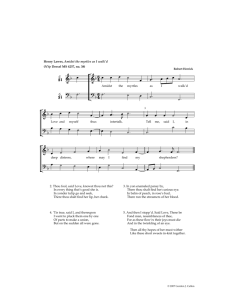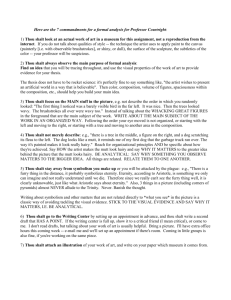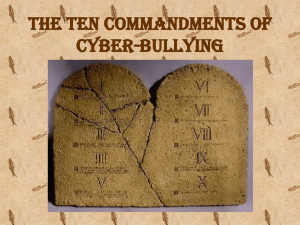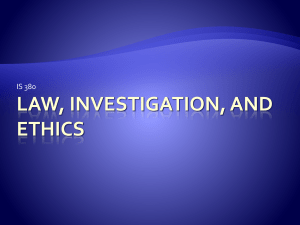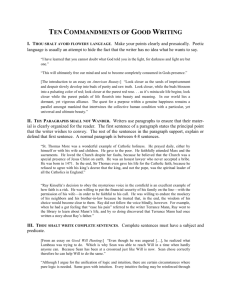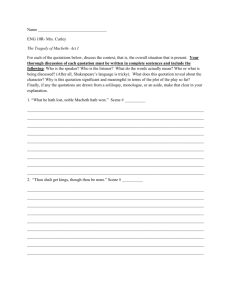Slides
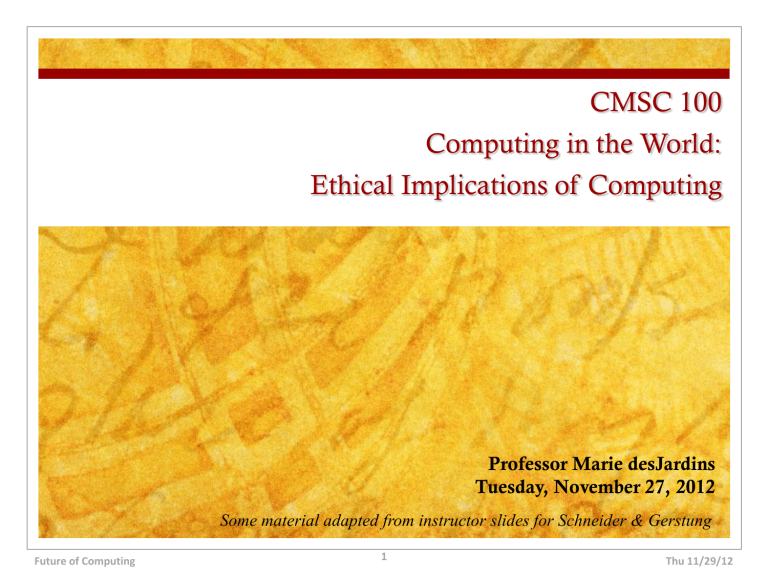
CMSC 100
Computing in the World:
Ethical Implications of Computing
Future of Computing
Professor Marie desJardins
Tuesday, November 27, 2012
Some material adapted from instructor slides for Schneider & Gerstung
1
Thu 11/29/12
Ethical Reasoning
Ethical Priniples
Ethics: The study of decisions regarding right and wrong
Consequentialism: Focus on the consequences (good and bad outcomes)
Utilitarianism: Focus on overall good for all parties
Dialectic : Explore an issue from both sides to lead to greater understanding
Analogy: Compare a new situation to a previous one to gain insight about similarities and differences
Deontology: The study of duty and obligation
Future of Computing 3 Thu 11/29/12
Kant’s Categorical
Imperative
First formulation: “Act only according to that maxim whereby you can, at the same time, will that it should become a universal law without contradiction.”
Universal moral proposition
Second formulation: “Act in such a way that you treat humanity, whether in your own person or in the person of any other, never merely as a means to an end, but always at the same time as an end.”
Third formulation: “Therefore, every rational being must so act as if he were through his maxim always a legislating member in the universal kingdom of ends.”
Future of Computing 4 Thu 11/29/12
5
Paramedic Ethics
Triage the situation...
Ask these questions when facing an ethical problem:
Who are the stakeholders in this situation?
What does each stakeholder have to gain or lose?
What duties and responsibilities are important?
Can you think of an analogous situation? Does it clarify the situation?
Make a decision or repeat in dialectic form
Invitation to Computer
Science, 6th Edition
5
Ethical Case Study:
Napster
7
Napster
Users began transmitting and sharing MP3 music in 1998
Napster file-sharing system was developed in 1999
Peer-to-peer file sharing :
Software introduces users to each other
Sharing happens directly between users
(...so it’s not Napster’s fault, ... right?)
Invitation to Computer
Science, 6th Edition
7
Future of Computing
8
Thu 11/29/12
9
Legality of Napster
Recording companies filed suit against Napster in 1999
Lawsuit claimed Napster was a conspiracy to encourage mass infringement of copyright
Facts:
Most shared music was copyrighted
Many artists opposed sharing: no revenue for them
Some artists supported sharing
Invitation to Computer
Science, 6th Edition
9
10
Napster’s Version of
Events
Napster claims:
Napster was just a “common carrier”
Napster reported song locations, but was not involved in actual sharing
They were not responsible for users’ behaviors
Swapping files in this way should be “fair use” under copyright law
Napster lost the case and appeals, and closed in 2001
Invitation to Computer
Science, 6th Edition
10
11
Life After Napster
Other sharing systems (Kazaa) arose
Paying to download music grew (iTunes)
Sharing movies, legally or not, is a growing issue
Downloading images from the web for personal use is a related ethical and legal question
The ethical (not legal) question:
Is it ethical to swap copyrighted MP3 music files?
Invitation to Computer
Science, 6th Edition
11
Utilitarianism For
12
Utilitarian argument that MP3 copying is OK:
There are many more music users than publishers
Music users are happy to get free access
Publishers get publicity for their products
File sharing is akin to hearing a song on the radio
Many users buy a song after listening to it
Drop in sales may relate more to purchasing song-by-song rather than by album
12
Invitation to Computer
Science, 6th Edition
13
Utilitarianism Against
Utilitarian argument that MP3 copying is not OK:
Early on, MP3 sharing encouraged CD sales, but long-term trend is reduction in sales
iTunes and Amazon sell one song at a time to compete with illegal file sharing
If publishers cannot profit, then less music will be made
Copyright protection is the law, and MP3 sharing is clearly illegal; encouraging illegal behavior is wrong
Invitation to Computer
Science, 6th Edition
13
14
Dialectic Analysis
In fact, music sales have dropped continuously
In the long term, the argument that less music would be published is a strong one
... but not yet resolved; maybe it’s just music distributors that are making fewer profits, but music artists have more direct access to their audience
Lesser-known artists may use file sharing to get better known, depend on income from performances
Rethink the music industry from a new viewpoint
Invitation to Computer
Science, 6th Edition
14
Next Topic
What Should We Talk
About Now?
Split into groups of 3-5
That means you!!!
Spend 5 minutes talking about the topics below, and reach a consensus about which of them you’d like to nominate for our class discussion:
Personal privacy online
The use of information filters at public libraries
Censoring information on the Web about making bombs
Loss of jobs due to automation
Online education and cheating
Remixing images/videos from the Web to create art
Legal rights for robots
Future of Computing 16 Thu 11/29/12
Let’s Vote...
We’ll pick one topic...
...and identify a specific decision or action to be made
Future of Computing 17 Thu 11/29/12
Now Discuss
Discuss in your groups for 10 minutes; then I’ll ask the groups to share their thoughts.
Think of an analogous situation that does not involve computing
Identify the significant stakeholders, and what they most value
Identify potential costs and benefits for each of the stakeholders
Identify duties and responsibilities of each stakeholder to each of the other stakeholder groups
Given the evidence above, what do you think is the right decision?
Future of Computing 18 Thu 11/29/12
Giving Effective
Presentations
Rules for presentations
General guidelines for preparing talks
Paper presentation guidelines for this class
Outline
20
4/11/12
2
0
Rule
Know what on earth you’re doing up there!
Rule #2: Know what you want to say
Rule #3: Know your audience
Rule #4: Know how long you have
21
4/11/12
21
Rule #2:
Know What You Want to Say
Just giving a summary/recap of the research paper you wrote is not interesting to most people
You should give enough detail to get your interesting ideas and observations across, but not enough to lose your audience
They want to hear what you learned that was
cool and why they should care
Whatever you do, don’t just read your slides!
22
4/11/12
2
2
Rule #3:
Know Your Audience
You’re talking to the other students (not me)
You need to be sure you’re explaining each new concept clearly
The most important thing is to emphasize
what you’ve discovered and why they should care!
23
4/11/12
2
3
Rule #4:
Know How Long You Have
How long is the talk? Are questions included?
A good heuristic is 1-2 minutes per slide
...but it depends a lot on the content of those slides!
If you have too many slides, you’ll skip some or—worse—rush desperately to finish. Avoid this temptation!!
Almost by definition, you never have time to say everything about your topic, so don’t worry about skipping some things!
Unless you’re very experienced giving talks, you should practice your timing
24
4/11/12
2
4
Slideology 101
Don’t just read your slides!
Use the minimum amount of text necessary
Use examples
Use a readable, simple, yet elegant format
Use color to emphasize important points, but avoid the excessive use of color
“Hiding” bullets like this is annoying (but sometimes effective), but…
Abuse of animation is a cardinal sin!
Don’t fidget, and…
Don’t just read your slides!
25
4/11/12
2
5
How to Give a Bad Talk
Advice from Dave Patterson, summarized by Mark Hill
3.
4.
1.
2.
5.
6.
7.
8.
9.
10.
Thou shalt not be neat
Thou shalt not waste space
Thou shalt not covet brevity
Thou shalt cover thy naked slides
Thou shalt not write large
Thou shalt not use color
Thou shalt not illustrate
Thou shalt not make eye contact
Thou shalt not skip slides in a long talk
Thou shalt not practice
26
4/11/12
2
6
Paper Presentations
Content: You should provide a well organized presentation of the topic you studied:
What is your application domain?
What are the three main applications of computing you’ve identified?
What are some of the social/ethical issues in this area?
Timing: You should aim for a 3-minute presentation.
This works out to (roughly) two to three slides
(but you could have more if you have mostly pictures that you’re going to talk about)
I will cut you off if you go too long!
There will be about 30 seconds after each talk for questions
27
4/11/12
2
7
Paper Presentations
Audience: Your audience consists of your fellow students. (I don’t count.)
Some are in your field, some are not
Most will not know much about your particular domain
You can’t assume a lot of existing knowledge
On the other hand, you only have three minutes! Be selective!
28
4/11/12
2
8
Giving the Presentation
You must prepare your presentation in PowerPoint or as a PDF and email it to me and the TAs no later than midnight the night before your presentation
Email to mariedj@cs.umbc.edu, kl4@umbc.edu (that’s an “L”, not the number “1”), clay2@umbc.edu, and sschneider713@gmail.com
Draft slides can optionally be sent to me for review, if you want feedback beforehand
I will only promise to review and comment on draft slides if they are sent
at least 24 hours before they are due! (i.e., by midnight two nights before your talk)
Practice your presentation, even if it’s just to yourself, to make sure your timing is correct
29
4/11/12
2
9
Grading and Feedback
Students are required to fill out a short feedback form for each presentation
You will receive these forms
I will also give you written feedback
Your grade will be based on:
Your level of preparation
The clarity of your presentation
The timing of your presentation
Other students’ evaluation of your presentation
30
4/11/12
3
0

